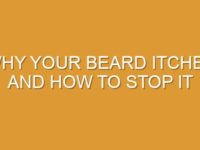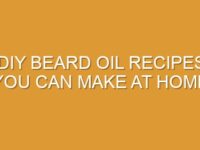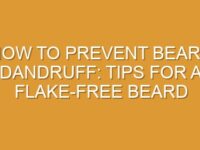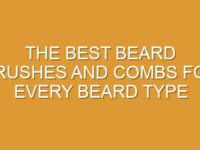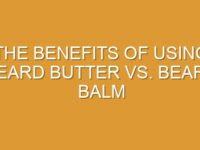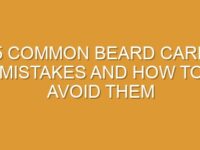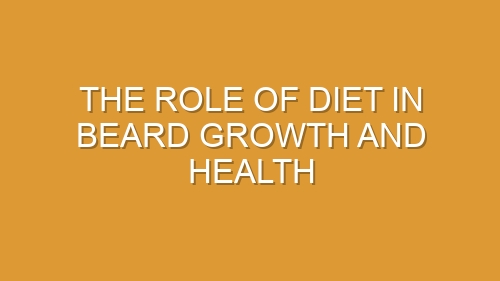-
Table of Contents
The Impact of Nutritional Deficiencies on Beard Growth and Health
Beards have become increasingly popular in recent years, with more and more men embracing their facial hair. However, growing and maintaining a healthy beard is not as simple as it may seem. Many factors can affect beard growth and health, including genetics, hormones, and lifestyle choices. One often overlooked factor is diet. What we eat plays a crucial role in the growth and health of our beards.
Nutritional deficiencies can have a significant impact on beard growth. Just like the hair on our heads, facial hair is made up of proteins called keratin. Without an adequate supply of protein in our diet, our bodies cannot produce enough keratin to support healthy beard growth. Protein-rich foods such as lean meats, fish, eggs, and legumes should be included in our daily diet to ensure that our beards receive the necessary nutrients.
In addition to protein, vitamins and minerals are also essential for beard health. Vitamin A, for example, promotes the production of sebum, the natural oil that keeps our beards moisturized and prevents them from becoming dry and brittle. Foods rich in vitamin A include carrots, sweet potatoes, and leafy greens. Vitamin E is another crucial nutrient for beard health, as it improves blood circulation to the hair follicles, promoting growth. Nuts, seeds, and avocados are excellent sources of vitamin E.
Iron deficiency is a common nutritional deficiency that can negatively impact beard growth. Iron is necessary for the production of hemoglobin, a protein that carries oxygen to the hair follicles. Without sufficient oxygen, the hair follicles cannot function properly, leading to slow or stunted beard growth. Red meat, spinach, and lentils are all excellent sources of iron that should be incorporated into our diet.
Omega-3 fatty acids are also vital for beard health. These healthy fats help to moisturize the skin underneath the beard, preventing dryness and itchiness. They also reduce inflammation, which can hinder beard growth. Fatty fish like salmon, walnuts, and flaxseeds are all rich sources of omega-3 fatty acids that can promote a healthy beard.
On the other hand, certain foods can have a negative impact on beard growth and health. Processed foods high in sugar and unhealthy fats can lead to inflammation and hormonal imbalances, both of which can hinder beard growth. Additionally, excessive alcohol consumption can deplete the body of essential nutrients, leading to poor beard health. It is important to limit the intake of these foods and beverages for the sake of our beards.
In conclusion, diet plays a crucial role in beard growth and health. Nutritional deficiencies can hinder beard growth, while a diet rich in protein, vitamins, and minerals can promote healthy beard growth. Including foods such as lean meats, fish, eggs, fruits, vegetables, nuts, and seeds in our diet can provide the necessary nutrients for a luscious and well-maintained beard. On the other hand, avoiding processed foods, excessive sugar, unhealthy fats, and alcohol can help maintain optimal beard health. By paying attention to our diet, we can ensure that our beards grow and thrive.
Essential Nutrients for Optimal Beard Growth and Maintenance
When it comes to growing and maintaining a healthy beard, many factors come into play. While genetics and age play a significant role, diet also plays a crucial part in beard growth and health. By ensuring that you consume the right nutrients, you can promote optimal beard growth and maintain its health and appearance.
One essential nutrient for beard growth is protein. Protein is the building block of hair, and a diet rich in protein can help stimulate beard growth. Good sources of protein include lean meats, fish, eggs, and dairy products. If you follow a plant-based diet, you can opt for plant-based protein sources such as tofu, tempeh, legumes, and nuts.
In addition to protein, vitamins and minerals are also vital for beard growth and maintenance. Vitamin A, for example, helps promote the production of sebum, the natural oil that moisturizes the hair follicles. Foods rich in vitamin A include carrots, sweet potatoes, spinach, and kale. Vitamin E is another important nutrient that can improve blood circulation to the hair follicles, promoting beard growth. You can find vitamin E in foods like almonds, sunflower seeds, and avocados.
B vitamins, particularly biotin, are known to support hair growth. Biotin helps strengthen the hair follicles and prevent hair breakage. Foods rich in biotin include eggs, nuts, whole grains, and leafy greens. Other B vitamins, such as B6 and B12, also play a role in maintaining healthy hair and can be found in foods like poultry, fish, and dairy products.
Omega-3 fatty acids are essential for overall hair health, including beard growth. These healthy fats help nourish the hair follicles and reduce inflammation, promoting healthy hair growth. Fatty fish like salmon and sardines are excellent sources of omega-3 fatty acids. If you’re vegetarian or vegan, you can obtain omega-3s from flaxseeds, chia seeds, and walnuts.
Antioxidants are also crucial for maintaining a healthy beard. They help protect the hair follicles from damage caused by free radicals, which can hinder beard growth. Foods rich in antioxidants include berries, citrus fruits, dark chocolate, and green tea.
While it’s important to focus on consuming the right nutrients for beard growth, it’s equally important to avoid certain foods that can negatively impact your beard’s health. Processed foods, sugary snacks, and excessive alcohol consumption can all contribute to poor beard health. These foods can lead to inflammation, which can hinder beard growth and cause hair breakage.
In conclusion, a well-balanced diet that includes protein, vitamins, minerals, omega-3 fatty acids, and antioxidants is essential for optimal beard growth and maintenance. By incorporating foods rich in these nutrients into your diet, you can promote healthy beard growth and maintain its appearance. Additionally, avoiding processed foods and excessive alcohol consumption can further support your beard’s health. Remember, growing a healthy beard is not just about genetics and age; it’s also about nourishing your body from the inside out.
Dietary Habits and Lifestyle Factors Affecting Beard Health
When it comes to growing and maintaining a healthy beard, many factors come into play. While genetics and age play a significant role, your diet and lifestyle habits can also have a significant impact on the growth and health of your facial hair. In this section, we will explore the dietary habits and lifestyle factors that can affect beard health.
First and foremost, it is essential to consume a well-balanced diet that is rich in vitamins and minerals. A diet lacking in essential nutrients can lead to weak and brittle hair, including your beard. To promote healthy beard growth, make sure to include foods that are high in protein, such as lean meats, fish, eggs, and legumes. Protein is the building block of hair, and a deficiency can result in slow or stunted growth.
In addition to protein, vitamins and minerals are also crucial for beard health. Vitamin A, for example, helps to produce sebum, the natural oil that moisturizes and nourishes the hair follicles. Foods rich in vitamin A include carrots, sweet potatoes, spinach, and kale. Vitamin E is another essential nutrient that promotes blood circulation to the hair follicles, aiding in beard growth. Nuts, seeds, and leafy greens are excellent sources of vitamin E.
Omega-3 fatty acids are also beneficial for beard health. These healthy fats help to moisturize the skin and prevent dryness and itchiness, which can hinder beard growth. Foods such as fatty fish, flaxseeds, and walnuts are excellent sources of omega-3 fatty acids.
While a healthy diet is crucial, it is equally important to maintain a healthy lifestyle. Stress, lack of sleep, and poor hygiene can all negatively impact beard health. Stress can disrupt hormone levels, leading to hair loss or slow growth. Finding healthy ways to manage stress, such as exercise or meditation, can help promote beard growth.
Adequate sleep is also essential for beard health. During sleep, the body repairs and regenerates cells, including hair follicles. Aim for seven to eight hours of quality sleep each night to support optimal beard growth.
Maintaining good hygiene is another vital aspect of beard health. Regularly washing and conditioning your beard helps to remove dirt, oil, and dead skin cells that can clog hair follicles and hinder growth. Be sure to use a gentle cleanser and conditioner specifically designed for facial hair to avoid drying out the skin and hair.
In addition to diet and lifestyle factors, it is worth noting that individual beard growth patterns can vary. Some men may naturally have thicker and faster-growing beards, while others may have to put in more effort to achieve their desired beard. It is essential to be patient and consistent with your beard care routine, as it can take several weeks or even months to see noticeable results.
In conclusion, diet and lifestyle habits play a significant role in beard growth and health. Consuming a well-balanced diet that is rich in protein, vitamins, and minerals can promote healthy beard growth. Additionally, managing stress, getting enough sleep, and maintaining good hygiene are crucial for optimal beard health. Remember, everyone’s beard growth journey is unique, so be patient and consistent in your efforts. With the right approach, you can achieve a healthy and luscious beard that you can be proud of.



